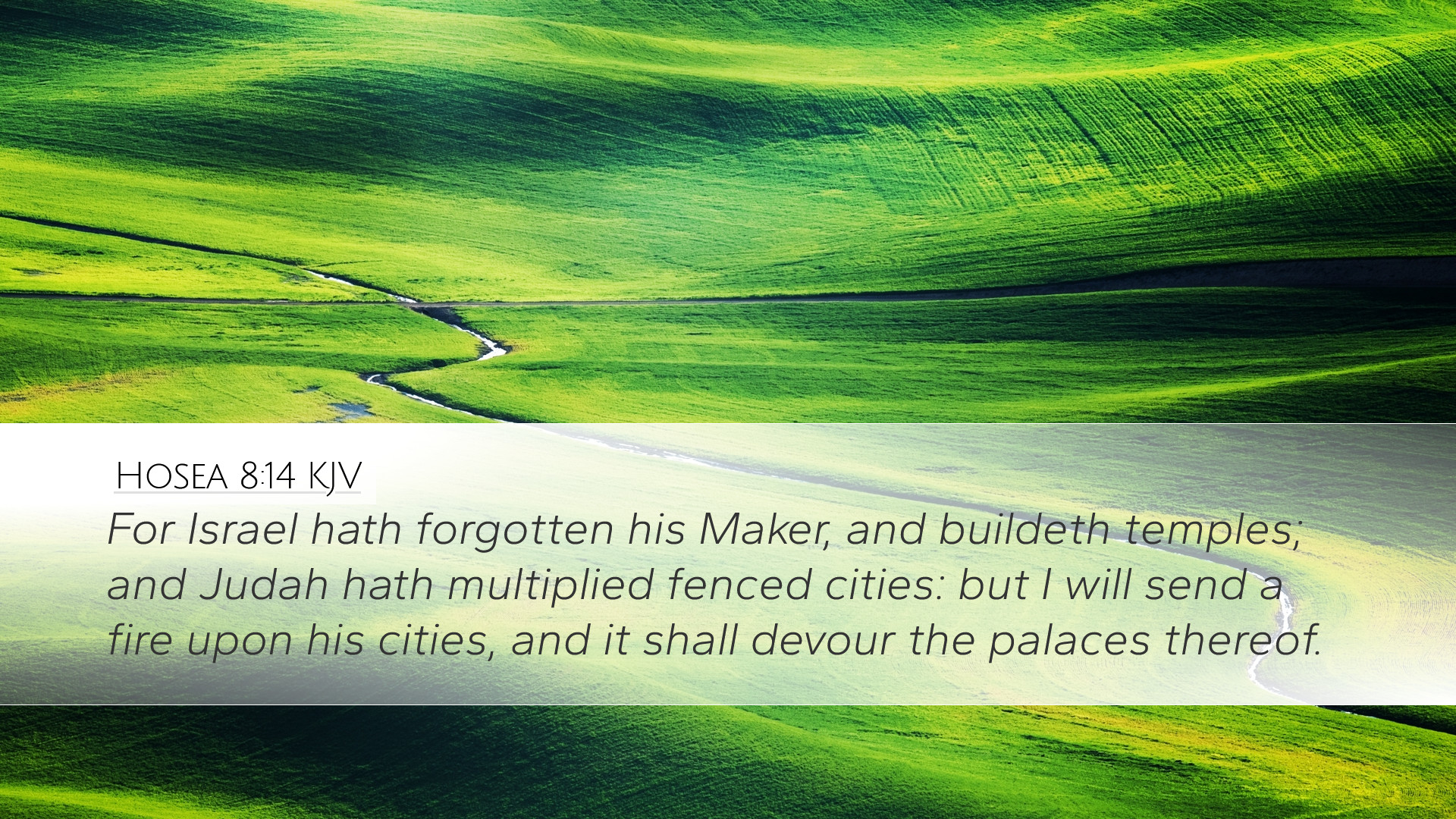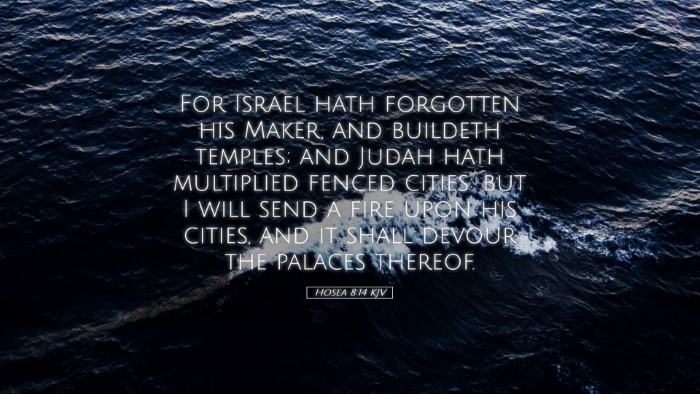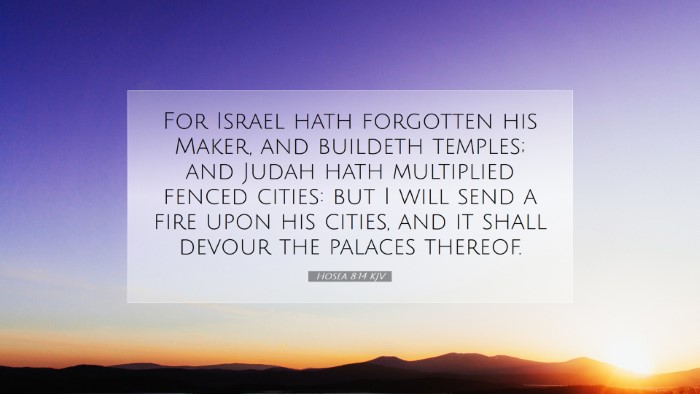Old Testament
Genesis Exodus Leviticus Numbers Deuteronomy Joshua Judges Ruth 1 Samuel 2 Samuel 1 Kings 2 Kings 1 Chronicles 2 Chronicles Ezra Nehemiah Esther Job Psalms Proverbs Ecclesiastes Song of Solomon Isaiah Jeremiah Lamentations Ezekiel Daniel Hosea Joel Amos Obadiah Jonah Micah Nahum Habakkuk Zephaniah Haggai Zechariah MalachiHosea 8:14
Hosea 8:14 KJV
For Israel hath forgotten his Maker, and buildeth temples; and Judah hath multiplied fenced cities: but I will send a fire upon his cities, and it shall devour the palaces thereof.
Hosea 8:14 Bible Commentary
Commentary on Hosea 8:14
Verse Context: Hosea 8:14 states, "For Israel hath forgotten his Maker, and buildeth temples; and Judah hath multiplied fenced cities: but I will send a fire upon his cities, and it shall devour the palaces thereof." This verse encapsulates a significant theme in the prophetic writings of Hosea, emphasizing Israel's neglect of God amidst their material pursuits.
Overview of Hosea
The Book of Hosea provides one of the most poignant illustrations of God's love and judgment. Hosea ministered during a time of great moral and spiritual decline in Israel. His prophetic mission reflects not only God's discontent with Israel’s transgressions but also His unwavering intention to restore His people.
Thematic Elements
- Forgetting the Maker: The phrase "Israel hath forgotten his Maker" highlights the profound disconnection between the Israelites and their covenantal God. In their prosperity, they have neglected their relationship with the Lord.
- False Security: The construction of temples and fenced cities symbolizes an erroneous sense of security and self-sufficiency, indicating a reliance on human endeavors rather than divine guidance.
- God's Judgment: The impending judgment, represented by the "fire upon his cities," serves as a divine response to Israel's idolatry and rebellion. It reflects the serious consequence of abandoning Yahweh.
Commentary Insights
Matthew Henry's Commentary
Matthew Henry emphasizes that Israel's forgetfulness of God led them to erect temples to false gods and build strongholds, trusting in their own strength rather than divine protection. He notes that such actions constitute a betrayal of their covenant with God. Henry articulates that God's response will be justly fierce, symbolized by the fire that will consume their cities. He draws parallels with contemporary religious life, warning against the complacency that often arises from material blessings at the expense of faithfulness to God.
Albert Barnes' Notes on the Bible
Albert Barnes expounds on the implications of Israel offering sacrifices and building altars, which were meant for true worship but had turned into acts of defiance by trying to placate God while simultaneously engaging in sin. Barnes outlines that the "fenced cities" of Judah reflect a misguided confidence in human strength and military might, which God will dismantle. He underscores the essential truth that reliance on earthly constructs leads to divine retribution, emphasizing the need for true repentance and restoration of relationship with God.
Adam Clarke's Commentary
Adam Clarke provides a vivid interpretation by highlighting the metaphor of fire as God's purifying and destructive force. He suggests that the cities represent the pride and arrogance of Israel. Clarke notes that while the people erected physical defenses, the real enemy was their spiritual apathy and disobedience to God. He calls attention to the irony that prosperity, which should have led to gratitude and worship, led instead to pride and forgetfulness of God.
Theological Implications
- The Nature of God’s Judgment: Hosea's prophecy serves as a reminder of the holiness of God and His righteous judgment, grounded in love and covenant faithfulness.
- The Danger of Idolatry: The text warns against the contemporary forms of idolatry which can distract believers from authentic worship and relationship with God.
- Call to Remembrance: Hosea’s admonition encourages believers to remember their Creator in all areas of life, particularly amidst societal distractions and material temptations.
Practical Applications
This verse provides profound lessons that can be applied in pastoral teaching, theological studies, and personal reflection:
- Prioritizing Relationship with God: Leaders should foster environments that encourage believers to deepen their relationship with God, avoiding external rituals that lack genuine heart connection.
- Evangelical Responsibility: The call to remembrance serves as a mandate for the Church to actively evangelize, reminding those around them of their need for God.
- Challenging Self-Sufficiency: Discipleship should challenge the belief in self-sufficiency and emphasize complete reliance on God’s provision and protection.
Conclusion
Hosea 8:14 stands as a poignant reminder of the propensity for humans to forget their Maker in times of prosperity. The insights drawn from the public domain commentaries emphasize the critical nature of Israel's spiritual state, the seriousness of their idolatry, and the resultant judgment from God. For contemporary readers, this text holds rich theological and practical implications, challenging believers to reflect on their relationship with God and the importance of prioritizing divine worship above earthly possessions.


